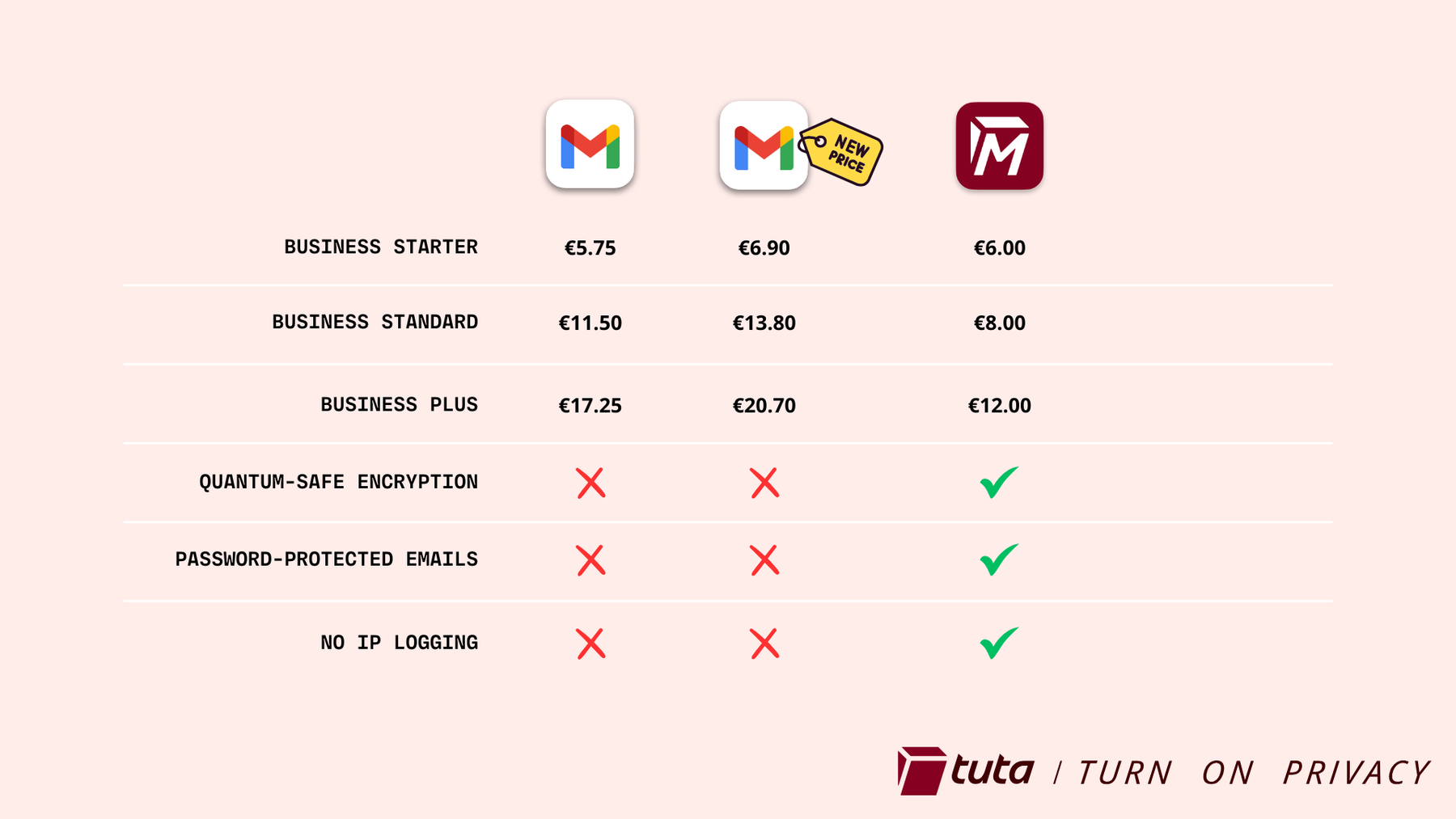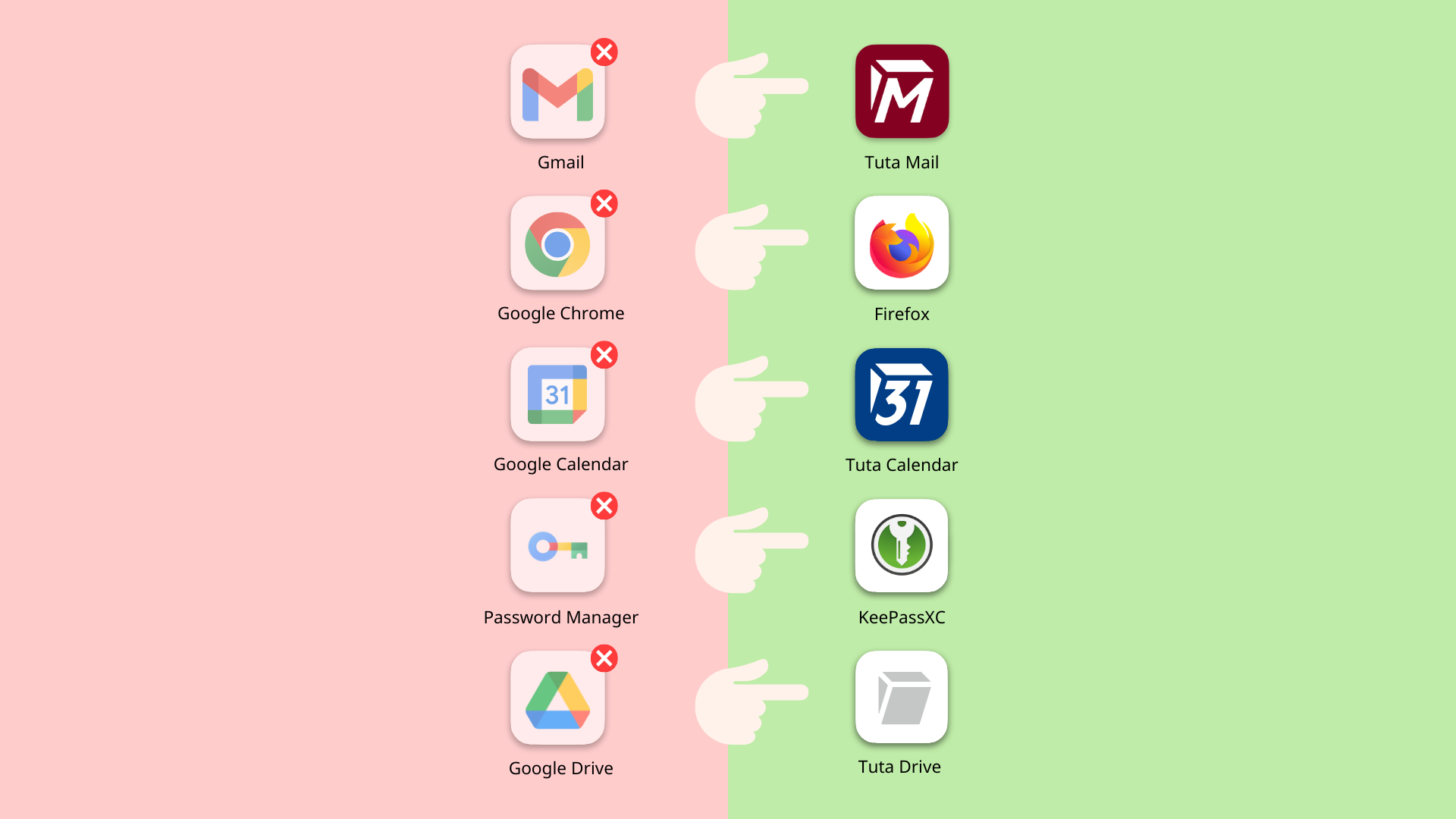G Suite (now Workspace) has another price hike. Time to choose an alternative and stop feeding AI with your data!
Since summer 2022 G-Suit Google legacy users need to pay more and more. Meet a secure Workspace alternative to say: Goodbye Google. Hello Privacy!
AI trade-off worth it?
Google’s 2025 Workspace update markets Gemini as a revolutionary step forward - one that is well worth paying a little extra. But is it? Really?
Gemini provides AI-generated emails, summaries, and note-taking, which is now built-in by default. There is no plan without Google’s AI features available. But on top of the price increase, there’s also a hidden cost: every document, email, and conversation may now be used to train the Google owned LLM Gemini.
Of course, you can disable Gemini, for instance on Android, but as a Google Workspace user, you still need to pay for it - even when disabled!
You pay Google to use Gemini AI while Google uses your data to improve its AI product - for free.
This leaves a bad taste and many feel it is completely unfair - and rightly so. On top of that, loyal customers simply can not afford the price increases anymore. As one user states on Reddit:
“Back when GSuite was free I started my account for my small business, it’s been great for the most part. I wasn’t happy when all the free accounts moved to pay, but took the small hit. Since then, it’s been one price rise after another and with another due this month I’m now paying $23AUD for 1 email account. My business is doing everything to not pass on extra costs, we’ll be hosting our website from home, but it seems everything we do, Google goes and has another price rise. I have a personal Gmail account and feel I should just forward everything to that, but then again it’s not really free these days either.”
Because ultimately, using Big Tech AI services isn’t just about cost. It’s also about trust in the provider and control over your own data. Google, like Meta and other tech giants, has faced a lot of criticism over its ad-based business model, which tracks users across the web to increase its own profits. At Tuta, we go so far as to say that the ad-based business model is doomed to die. By adding generative AI tools to its Workspace offer, the Google solution appears more and more like a privacy trade-off, not a productivity suite that puts the users’ interests first.
Google Workspace alternative: Goodbye Google, Hello Privacy!
But change is possible. If you are fed up with Google using your Gmail data to train its AI or with ads in Gmail, you can switch to a privacy-first alternative. There are lots of options to “deGoogle”, as a small business you can start by moving your email address to Tuta Mail. Tuta Mail offers the best security as it’s fully encrypted with quantum-safe algorithms, and prices are lower compared to Google Workspace. Tuta’s starting price for businesses is €6 per user per month, and non-profits, schools and open source projects can also apply for a 50% discount, which lowers the price to €3/month.


Aside from prices, there are lots of reasons to switch to Tuta Mail and Tuta Calendar.
No Surveillance, No AI: Tuta puts the users first. Tuta does not use and abuse user data to train AI models or to fuel ad-based tracking. Instead, Tuta comes with zero ads and zero tracking. The users’ are Tuta’s only stakeholders and all business decisions are made to satisfy users - not advertisers or AI developers.
Quantum-safe Encryption: Tuta encrypts all data end-to-end with a hybrid encryption model that uses traditional as well as quantum-resistant algorithms to protect your data now, and in the future.
Transparent & Fair Prices: Tuta offers simple, predictable plans without hidden AI price increases. There’s no sudden cost increase because a new AI feature was introduced you didn’t ask for.
Data Stored in Germany, Protected by EU Law: Tuta is based in Germany and is subject to strict GDPR data protection rules. Google Workspace on the other hand is operated by a U.S. company, thus, it can not offer enough data protection, let alone data sovereignty for European-based companies.
Of course, you can not replace all Google Workspace apps with Tuta because Tuta currently consists of encrypted email, calendar, and contacts, and is also working on a drive storage and file sharing solution. Nevertheless, you can combine Tuta with other privacy-first services to fully quit Google
Make the switch
How to export your data from Google
Google has an extensive support page that explains how you can export your data from Google Workspace as an admin.
If you only want to export your email data from Google, Google explains here that you can not do this with the standard Data Export tool, but each user needs to export this data from within their individual login.
How to import your data to Tuta
Emails
Email import is still in beta, but you can import your emails to Tuta Mail when on the Legend or Unlimited plan. Check our FAQ to learn how to import emails to Tuta.
Contacts
You can import contacts via vCard: Login to Tuta with a browser and go to ‘Contacts’ and click on the three dot button next to ‘All contacts’. Here you can import contacts via vCard.
Calendars
You can import calendars via .ics: Login with a browser and go to ‘Calendar’. Click on the three-dot button next to the calendar you wish to import data to. You can also create a new, separate calendar for the data to be imported by clicking on the plus symbol next to ‘Your calendars’.
Thank you for choosing Tuta Mail and Tuta Calendar. Together we will make the web a better place!
Timeline: Google Workspace price increases
2006 Google Apps launched in August 2006 which included Gmail with custom domain support, Calendar, Talk, and Page Creator and used to be completely free.
2007 Google Apps Premier Edition launched in February 2007 for $50/user/year which was the first paid version targeting businesses with added support and more storage.
2012 Google stopped offering Google Apps for free to new users starting in December 2012.
2016 Google Apps became G Suite without an immediate price change. It now offered several plans: Basic for $5/user/month and Business for $10/user/month.
2019 Google increased prices for G Suite in April 2019 to $6/user/month for Basic and to $12/user/month for Business.
2020 G Suite became Google Workspace in October 2020 with a new tier structure. New plans came at $6/user/month for Business Starter, $12/user/month for Business Standard and $18/user/month for Business Plus. These replaced the previous Basic and Business tiers
2023 Google Workspace increased prices again to $7.20/user/month for Business Starter, $14.40/user/month for Business Standard and $21.60/user/month for Business Plus.
2022–2023 The free use of G Suite for legacy users was phased out and free G Suite legacy users had to switch to paid Workspace or choose a Google alternative like Tuta. Due to heavy backlash from the community, Google continued to offer a free version for personal use, but not for businesses.
2025 Google Workspace increased prices again to $8.40/user/month for Business Starter, $16.80/user/month for Business Standard and $26.40/user/month for Business Plus.
So, in nine years - from 2016 to 2025 - Google increased its prices for Google Workspace by 68%. Let’s take a look at how Google handles its price increases by zooming in on when Google decided to discontinue G Suit Google legacy free accounts.
G Suite legacy free edition discontinued in 2022
Google Apps (later G Suite, and then Google Workspace) was originally free in order to attract as many users as possible to Google’s new service with custom domain support. When Google decided it now had enough users, the company decided to phase out the free version. A classic “bait-and-switch” strategy.
Google turned off its G Suite legacy free edition for all users that were able to get free Google Apps services tied to a custom domain between 2006 and 2012. Google’s initial plan was to force these users to either start paying a minimum of $6 per user per month, or else they would lose access to services such as Gmail with a custom domain.
Lots of families, associations and small companies that got hold of the free G Suite legacy edition before 2012 were seeing themselves forced to upgrade - or look for an alternative.
The starting price of $6 per user for Google Apps was also rather steep, particularly for families or non-profit associations. However, due to an immense backlash from the community about this change, Google decided to keep the free offer for private customers.
For a long time, sticking with Google was the path of least resistance. But with rising prices, unexpected changes for legacy users, and unasked for integrations of features such as the new Gemini, that loyalty is crumbling. Nobody likes “bait-and-switch”, even though this strategy has made many Big Tech services big. As users do not want to pay for features they didn’t ask for - and potentially compromise their data in the process - Tuta Mail and other privacy-first alternatives stand out as a secure, ethical, and affordable alternative.
Google’s original G Suit announcement
Google announced its change for free G Suite legacy accounts in January 2022 with this statement:
“Upgrade from G Suite legacy free edition: Switch to a paid edition and get premium collaboration tools, more storage, and increased security If you have the G Suite legacy free edition, you need to upgrade to a paid Google Workspace subscription to keep your services. The G Suite legacy free edition will no longer be available starting July 1, 2022."
"Upgrade to Google Workspace by May 1, 2022: To maintain your services and accounts, review the information below and upgrade by May 1, 2022. Upgrading to a Google Workspace subscription is a seamless transition for all customers currently on the G Suite legacy free edition. Select the Flexible payment plan when you upgrade to use your new subscription at no cost until at least July 1, 2022. If you choose to wait, Google will begin upgrading subscriptions automatically on May 1, 2022. We will upgrade your organization to a new Google Workspace subscription based on the features you currently use. To complete the upgrade, set up Google Workspace billing before July 1, 2022. If you don’t provide your payment information, your Google Workspace subscription will be suspended until you set up billing. After 60 days in suspension, you will no longer have access to Google Workspace core services, such as Gmail, Calendar, and Meet. Enter a valid form of payment to restore your suspended account. If you don’t upgrade to a Google Workspace subscription, you will not lose access to other Google services, including YouTube, Google Photos, and Google Play, nor paid content, including YouTube and Play Store purchases.”


